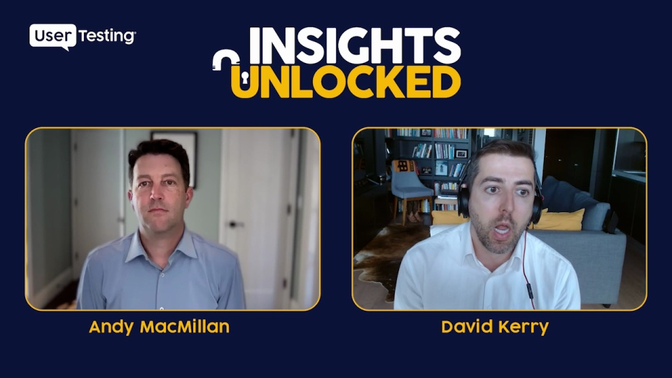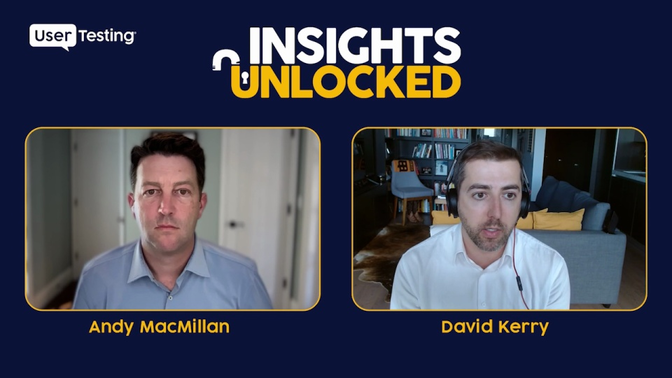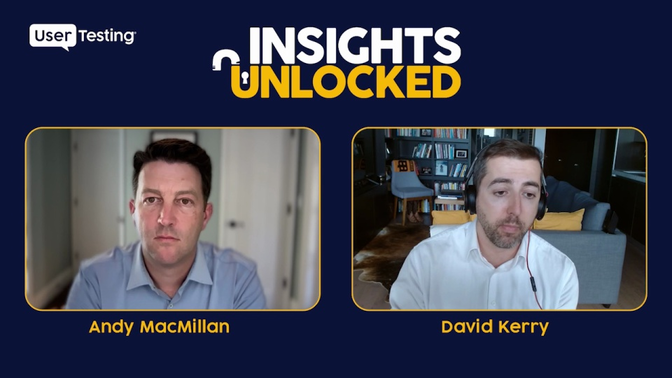
Episode 119 | May 27, 2024
Calculating and communicating the ROI of UX research in your organization
In this episode, UserTesting’s Dave Kerry and Andy MacMillan discuss the value of UX research and how organizations can learn to calculate it.
Calculating and communicating the ROI of UX research in your organization
In the rapidly evolving landscape of digital products, understanding the return on investment (ROI) of User Experience (UX) research is not just beneficial—it's essential.
The latest episode of the Insights Unlocked podcast, featuring Dave Kerry, UserTesting’s Global Value Engineering Director, dives deep into the significant role of UX in shaping business strategies through measurable outcomes.
“We see a gap between UX research teams and their executives who want their business to be customer centric,” Dave said. “They fundamentally understand the importance of talking to their customers, but they don’t fully grasp the impact of this work.”

Why measure UX ROI?
User experience now drives business growth more than ever. However, the value of UX research can sometimes be overshadowed by its intangible nature, making it challenging for teams to showcase their direct impact on business outcomes. Dave discusses the critical importance of not only conducting UX research but also quantifying its benefits to secure the necessary backing and resources from stakeholders.
Dave has worked with close to 350 UserTesting customers, across 19 verticals, to examine the financial and P&L impact of their UX investments. From that research, he has identified four value drivers of UX research:
- Driving business growth
- Helping companies innovate faster
- Reducing operational costs
- Mitigating risk
For the companies that are investing in UX research, he said, they typically see a 5x to 7x return on their investment in these activities. “And for the folks that aren’t,” he said. “Quite frankly, they’re being left behind.”
"And for our clients who are doing this really effectively, they're managing their customer experience. They typically see about a 5 to 7 times return on their investment on these activities." —Dave Kerry, UserTesting’s Global Value Engineering Director
Bridging the gap between UX teams and business goals
UX teams often find themselves in a silo, removed from the direct flow of business decision-making. Dave emphasizes the need for these teams to bridge the gap by aligning their research outcomes with overarching business objectives. This alignment ensures that every UX decision contributes directly to the company's bottom line and strategic goals, thus reinforcing the value of UX investments.

A banking case study of what happens when UX Research isn't performed
Dave shares a compelling case from the banking industry where ignoring user preferences in developing a digital app for high-net-worth clients led to lost opportunities and costly work that could have been invested elsewhere. This example starkly illustrates how assumptions without user validation can result in not only failed projects but also wasted investments.
Quantifying and Communicating the ROI of UX
One of the most potent strategies discussed is the method of quantifying the UX outcomes. Dave suggests adopting both qualitative insights and quantitative data to present a compelling case to the stakeholders. This approach not only underscores the effectiveness of UX research but also highlights its role in mitigating risks and reducing costs through informed decision-making.

Embedding UX into the Business Strategy
UX should not be an afterthought but a fundamental aspect of business strategy. Companies that integrate UX insights into their product development lifecycle from the start can significantly enhance customer satisfaction and drive business growth. Dave explains how teams can leverage UX research to prevent rework, optimize product features, and ultimately, enhance the user experience.
Conclusion: The Future of UX Research
Looking ahead, the role of UX research in business is set to grow even more influential. As companies compete increasingly on customer experience, the ability to rapidly adapt and respond to user feedback will dictate market success. Investing in UX is not just about improving product design; it's about building resilient businesses poised for growth and innovation.

Call to Action: For UX researchers, product managers, and business strategists, understanding and implementing the principles discussed in this podcast could be a game-changer. Tune into the Insights Unlocked podcast for more expert insights on leveraging UX to drive business success.
Episode links:
- Connect with Dave Kerry on LinkedIn
- Follow Andy MacMillan on LinkedIn
- WEBINAR: Connecting to value: Tips, tools, and tactics to help demonstrate the ROI of research and insights
- GUIDE: The executive's guide to empathy-driven ROI
- BLOG: Measuring UX impact
- PODCAST: How to get executive buy-in for experience research
- WEBINAR: The ROI of human insight: prove your value to upper management
- WEBINAR: Top 3 ways product leaders will achieve operational excellence in 2024










